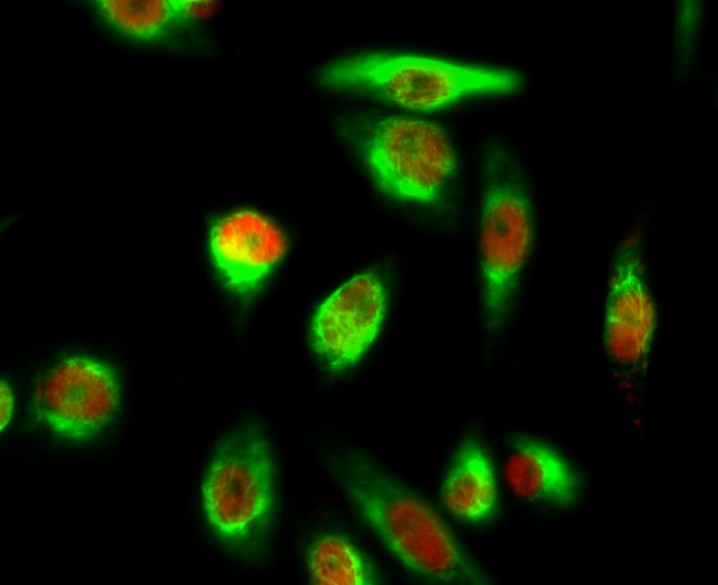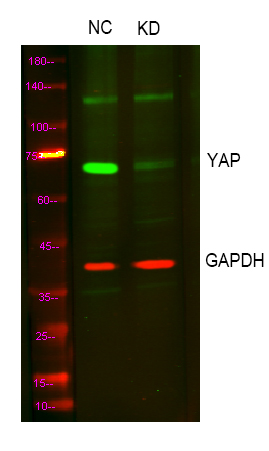Total YAP Cell-Based Colorimetric ELISA Kit
- Catalog No.:KA3612C
- Applications:ELISA
- Reactivity:Human;Mouse;Rat
- Gene Name:
- YAP1
- Human Gene Id:
- 10413
- Human Swiss Prot No:
- P46937
- Mouse Swiss Prot No:
- P46938
- Rat Swiss Prot No:
- Q2EJA0
- Storage Stability:
- 2-8°C/6 months
- Other Name:
- Yorkie homolog (65 kDa Yes-associated protein) (YAP65)
- Detection Method:
- Colorimetric
- Background:
- PTM:Phosphorylated upon DNA damage, probably by ATM or ATR.,similarity:Contains 1 WW domain.,subunit:Binds to the SH3 domain of the YES kinase. Binds to WBP1 and WBP2. Binds, in vitro, through the WW1 domain, to neural isoforms of ENAH that contain the PPSY motif.,
- Function:
- regulation of transcription, DNA-dependent, regulation of transcription from RNA polymerase II promoter, positive regulation of biosynthetic process, positive regulation of macromolecule biosynthetic process, positive regulation of macromolecule metabolic process, positive regulation of gene expression, positive regulation of cellular biosynthetic process, regulation of transcription, positive regulation of transcription, DNA-dependent, positive regulation of nucleobase, nucleoside, nucleotide and nucleic acid metabolic process, positive regulation of transcription, positive regulation of transcription from RNA polymerase II promoter, positive regulation of nitrogen compound metabolic process, regulation of RNA metabolic process, positive regulation of RNA metabolic process,
- Subcellular Location:
- Cytoplasm . Nucleus . Both phosphorylation and cell density can regulate its subcellular localization (PubMed:18158288, PubMed:20048001). Phosphorylation sequesters it in the cytoplasm by inhibiting its translocation into the nucleus (PubMed:18158288, PubMed:20048001). At low density, predominantly nuclear and is translocated to the cytoplasm at high density (PubMed:18158288, PubMed:20048001, PubMed:25849865). PTPN14 induces translocation from the nucleus to the cytoplasm (PubMed:22525271). Localized mainly to the nucleus in the early stages of embryo development with expression becoming evident in the cytoplasm at the blastocyst and epiblast stages (By similarity). .
- Expression:
- Increased expression seen in some liver and prostate cancers. Isoforms lacking the transactivation domain found in striatal neurons of patients with Huntington disease (at protein level).
- June 19-2018
- WESTERN IMMUNOBLOTTING PROTOCOL
- June 19-2018
- IMMUNOHISTOCHEMISTRY-PARAFFIN PROTOCOL
- June 19-2018
- IMMUNOFLUORESCENCE PROTOCOL
- September 08-2020
- FLOW-CYTOMEYRT-PROTOCOL
- May 20-2022
- Cell-Based ELISA│解您多样本WB检测之困扰
- July 13-2018
- CELL-BASED-ELISA-PROTOCOL-FOR-ACETYL-PROTEIN
- July 13-2018
- CELL-BASED-ELISA-PROTOCOL-FOR-PHOSPHO-PROTEIN
- July 13-2018
- Antibody-FAQs


